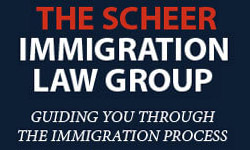Adjustment of Status for Individuals with Extraordinary Ability in New Jersey: EB-1A Cases
The United States offers various pathways for talented individuals to obtain permanent residency, and one of the most prestigious routes is the EB-1A visa. This visa category is reserved for those who have demonstrated extraordinary ability in their field, whether in the arts, sciences, education, business, or athletics. The path to securing permanent residency through an EB-1A visa involves several steps, with the adjustment of status being a critical phase in the process. This page delves into the nuances of adjustment of status for individuals with extraordinary ability in New Jersey, particularly focusing on EB-1A cases.
Understanding the EB-1A Visa
The EB-1A visa is designed for individuals who have reached the pinnacle of their professions. Unlike other employment-based visas, the EB-1A category does not require a job offer or labor certification. This independence is a significant advantage, allowing individuals to self-petition for their green card. However, the criteria for an EB-1A visa are stringent. Applicants must provide substantial evidence of their extraordinary ability, typically by demonstrating sustained national or international acclaim in their field. This can be shown through major awards, publications, original contributions, and other significant achievements. The success of an EB-1A petition largely depends on the strength and quality of the evidence presented, making it crucial for applicants to thoroughly document their accomplishments.
Attorney Susan W. Scheer attended Douglass College at Rutgers University and received her B.A. in 1974. She attended Georgetown University to get her M.A.T. in 1977 and went on to receive her J.D. from Georgetown as well in 1982. Susan is admitted to practice in New Jersey and before the United States Supreme Court.
Susan speaks Spanish, French, Hebrew, and Portuguese.
Eligibility for Adjustment of Status
Once an individual’s EB-1A petition is approved, the next step is to apply for adjustment of status to become a lawful permanent resident. To be eligible for adjustment of status, several conditions must be met. First, the applicant must be physically present in the United States. This means that the individual must have entered the country legally and maintained a valid nonimmigrant status throughout their stay. Additionally, the applicant must not be subject to any grounds of inadmissibility, such as criminal convictions or immigration violations. Those who meet these criteria can file Form I-485, Application to Register Permanent Residence or Adjust Status, with the U.S. Citizenship and Immigration Services (USCIS).
What are the Requirements to File for U.S Citizenship?
Including Your Spouse and Children in a Green Card Application
Working While an Adjustment Application is Pending
Filing for Adjustment of Status
Filing for adjustment of status is a meticulous process that requires careful attention to detail. The primary form to be submitted is Form I-485, but applicants may also need to include several supporting documents. These typically include a copy of the applicant’s I-140 approval notice, proof of legal entry into the United States, and evidence of continued eligibility for the EB-1A visa. It is also necessary to submit Form I-765, Application for Employment Authorization, and Form I-131, Application for Travel Document, if the applicant wishes to work or travel while their adjustment of status application is pending. Each of these forms must be completed accurately and thoroughly, as any errors or omissions can lead to delays or denials.
Challenges in the Adjustment of Status Process
The adjustment of status process can be challenging, especially for EB-1A applicants. One of the most common obstacles is the issue of maintaining nonimmigrant status. For many individuals, the transition from a nonimmigrant visa to permanent residency can be complicated by changes in employment, travel, or other life circumstances. It is essential to remain vigilant about maintaining legal status throughout the process. Another challenge is the potential for requests for evidence (RFEs) from USCIS. These requests typically ask for additional documentation to support the adjustment of status application. Responding to RFEs promptly and thoroughly is crucial to keeping the process on track.
Processing Times
The time it takes to process an adjustment of status application can vary widely. On average, it can take several months to over a year for USCIS to adjudicate an I-485 application. Factors that influence processing times include the applicant’s country of origin, the complexity of the case, and the workload at the specific USCIS service center handling the application. While waiting for a decision, applicants may receive requests for biometrics, which involve providing fingerprints and photographs. These appointments are usually scheduled within a few weeks of filing the application and are a routine part of the process.
Interviews
In many cases, USCIS requires applicants to attend an interview as part of the adjustment of status process. During the interview, a USCIS officer will ask questions to verify the information provided in the application and assess the applicant’s eligibility for permanent residency. While the prospect of an interview can be daunting, thorough preparation can help ease the process. It is advisable to review all submitted documents, including the original EB-1A petition, and be prepared to discuss any aspects of the case in detail. Applicants should also bring copies of all relevant documents to the interview, including their passport, I-94 arrival/departure record, and any other documents that support their case.
Approval and Beyond
Once USCIS approves the adjustment of status application, the applicant becomes a lawful permanent resident, also known as a green card holder. This status grants several significant benefits, including the ability to live and work permanently in the United States. Green card holders can also travel freely in and out of the country, although they must be mindful of maintaining their permanent residency by not spending extended periods abroad. Additionally, after five years as a permanent resident, individuals may be eligible to apply for U.S. citizenship, provided they meet the necessary requirements.
Maintaining Permanent Residency
Becoming a permanent resident comes with both rights and responsibilities. Green card holders have the right to live and work in the United States, sponsor certain family members for permanent residency, and apply for U.S. citizenship when eligible. However, they also have the responsibility to comply with all U.S. laws, file U.S. tax returns, and avoid any actions that could jeopardize their permanent resident status. For instance, committing certain crimes, failing to report changes in address, or spending extended time outside the United States could result in the loss of permanent residency. It is essential for green card holders to be aware of these responsibilities and take proactive steps to maintain their status.
Adjustment of Status Denials
While many adjustment of status applications are approved, some may be denied. A denial can occur for various reasons, including failure to maintain nonimmigrant status, inadmissibility issues, or insufficient evidence of eligibility. When an application is denied, USCIS typically provides the reasons for the denial in writing. In some cases, applicants may be able to appeal the decision or file a motion to reopen or reconsider the case. It is crucial to act quickly and consult with an immigration guide if an adjustment of status application is denied, as there may be limited time to respond or address the issues that led to the denial.
The Role of Legal Guidance
Given the complexity of the adjustment of status process, particularly for EB-1A cases, having legal guidance can make a significant difference. An immigration guide can help applicants understand the requirements, prepare the necessary documentation, and navigate any challenges that arise. They can also provide valuable insights into how to present a compelling case for adjustment of status and respond effectively to any requests for evidence or interviews. For individuals seeking to adjust their status in New Jersey, working with a guide who is experienced in EB-1A cases can be especially beneficial, as they can offer tailored advice and support throughout the process.
The path to obtaining permanent residency through the EB-1A visa is a rewarding yet challenging journey. At Scheer Immigration Law Group, we understand the unique needs and concerns of individuals with extraordinary abilities. Our team is dedicated to providing personalized guidance and support to help you navigate the adjustment of status process with confidence. If you are seeking to adjust your status in New Jersey, we are here to assist you every step of the way. Contact Scheer Immigration Law Group today to learn how we can help you achieve your immigration goals.



 From the initial consultation to the successful resolution of my case, their commitment to excellence was evident. Scheer Immigration Law Group not only provided legal expertise but also exhibited a genuine concern for my well-being throughout the journey.
From the initial consultation to the successful resolution of my case, their commitment to excellence was evident. Scheer Immigration Law Group not only provided legal expertise but also exhibited a genuine concern for my well-being throughout the journey.




